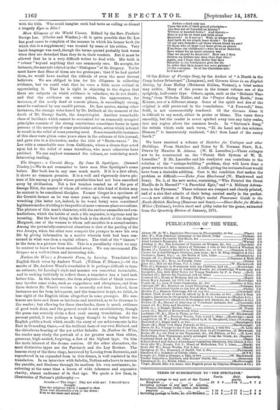merits of Mr. Andrew Wood's translation it is perhaps difficult
to form
an estimate, for Lessing's style and manner are somewhat intractable, and in seeking faithfully to reflect these, a translator has a hard task before him. In this instance, the form adopted—that of blank verse—
may involve some risks, such as ruggedness and abruptness, and from these defects Mr. Wood's version is assuredly not free. Indeed, these instances are far from infrequent, and the translator is apt, we think, to lose sight of the English idiom altogether in some passages. His sen- tences are here and there so intricate and involved, as to be tiresome to the reader ; but allowing for these drawbacks, there is much evidence of good work done, and the general result is not unsatisfactory, though the poem can scarcely claim a first rank among translations. At the present period, it was perhaps a happy thought to bring before the English public a book which recalls the story of our achievements in the East in Crusading times,—of the brilliant feats of our own Richard. and the chivalrous bearing of the yet nobler Saladin. In Nathan the Wise, the reader may study the portrait of a far greater man than either, generous, high-souled, forgiving, a Jew of the highest type. On him the main interest of the drama centres. Of the other characters, the most distinctive types are the Patriarch and the Lay Brother. The famous story of the three rings, borrowed by Leasing from Boccaccio, and reproduced in an expanded form in this drama, is well rendered in the translation. In an interview with Saladin, Nathan asks leave to narrate the parable, and discloses through its medium his own sentiments, in- culcating at the same time a lesson of wide tolerance and expansive charity, almost undreamt of in that age. We quote a few lines, in illustration of Nathan's philosophy :—
Saladie.—"Tbe rings ! Play not with me! I should have
thought That the religions which I named to thee Were well discernible e'en to the dress ; E'en to the meat and drink!
Naihan.—And only not 'Upon the side of their grand principles—
Are they not all founded on history ?
Written or handed down? And history—
Must it not be on trust and faith alone Received? Js it not so ? Well, to whose trust And faith do we attach least doubt ? To that Of our own friends ?—of those whose blood we are?
Of those who of their love have given us proofs E'en from our childhood 2—who us neer deceived,
Save where for us more salutary was
That we should be deceived ? How can I then
Believe my fathers less than thou doet thine?
Again, can I from thee desire that thou
Shouldst to thy forefathers give the lie, In order that thou mayst not mine gainsay ?
Or the converse. So of the Christians also.
Is it not so?"






























 Previous page
Previous page